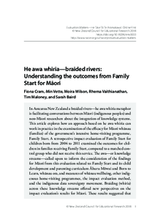In Aotearoa New Zealand a braided rivers—he awa whiria metaphor is facilitating conversations between Māori (indigenous peoples) and non-Māori researchers about the integration of knowledge systems. This article explores how an approach based on he awa whiria can work in practice in the examination of the efficacy for Māori whānau (families) of the government’s intensive home-visiting programme, Family Start. A retrospective impact evaluation of Family Start for children born from 2004 to 2011 examined the outcomes for children in families receiving Family Start, compared to a matched control group who did not receive this service. The awa—or knowledge streams—called upon to inform the consideration of the findings for Māori from this evaluation related to: Family Start and its child development and parenting curriculum Āhuru Mōwai and Born to Learn, whānau ora, and measures of whānau wellbeing, other indigenous home-visiting programmes, the impact evaluation method, and the indigenous data sovereignty movement. Braiding (whiria) across these knowledge streams offered new perspectives on the impact evaluation’s results for Māori. These results suggested that Family Start reduced post-neonatal mortality for Māori children, regardless of whether the Family Start provider was Māori or nonMāori. Māori children receiving Family Start were more likely to be fully up-to-date with immunisations at age 2, and their mothers were more likely to access services for treatment of addiction relative to the control group. The impact of Family Start on child maltreatment was uncertain. He awa whiria provided a vehicle for Māori and non-Māori research and practice expertise to contribute knowledge to understanding Family Start and explaining these findings. This metaphor holds the promise of supporting Māori engagement with the growing use of linked administrative data.

